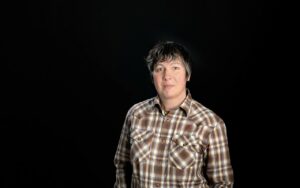Graduate Student Spotlight: Beatrice Szymkowiak
Fourth-year PhD Student in Creative Writing

Poetic experimentation and exploration allow me to investigate the new environmental trajectory of the Anthropocene. My poetry chapbook Red Zone is the first chapter of an investigation. The landscape of Red Zone is the North of France, where I was born and raised. Throughout the collection, words decompose into the soil of a landscape still scarred by WWI trench war. Sheep wander eerie pastoral clearings, yet underneath, exploded and unexploded ammunitions abound and leak dangerous chemicals. This paradox is the premise of reflection: what does nature’s resilience mean? Do poisoned environments dissolve tongues into useless discourse? What is our responsibility, as humans and writers?
My current creative work continues an inquiry into our environmental responsibility with a project focused on The Birds of America –– J. J. Audubon’s iconic ornithological and archival work. Knowing that North America has lost 3 billion birds since 1970 (Science, 2019) inspired a process of lyrical erasure and reflection, to question the Western world’s impulse to archive nature and its heuristic approach to nature. My writing process starts by considering the text of Birds of America as an archival cage. I then selectively erase the textual cage to reveal its ambiguity and the complex relationship between humanity and nature. As the cage disappears, birds escape, their voices inextricably entangled with ours. The “we” becomes equivocal. Slashes sever words, like wings or bird-shot pellets, reminding us that we are at a crossroad, and that we have a responsibility for the future of our planet.
My grandfather was a coalminer, and as he dug into the entrails of the earth, he listened to the canary sing from its cage to preserve lives. I would like poetry to be that song.